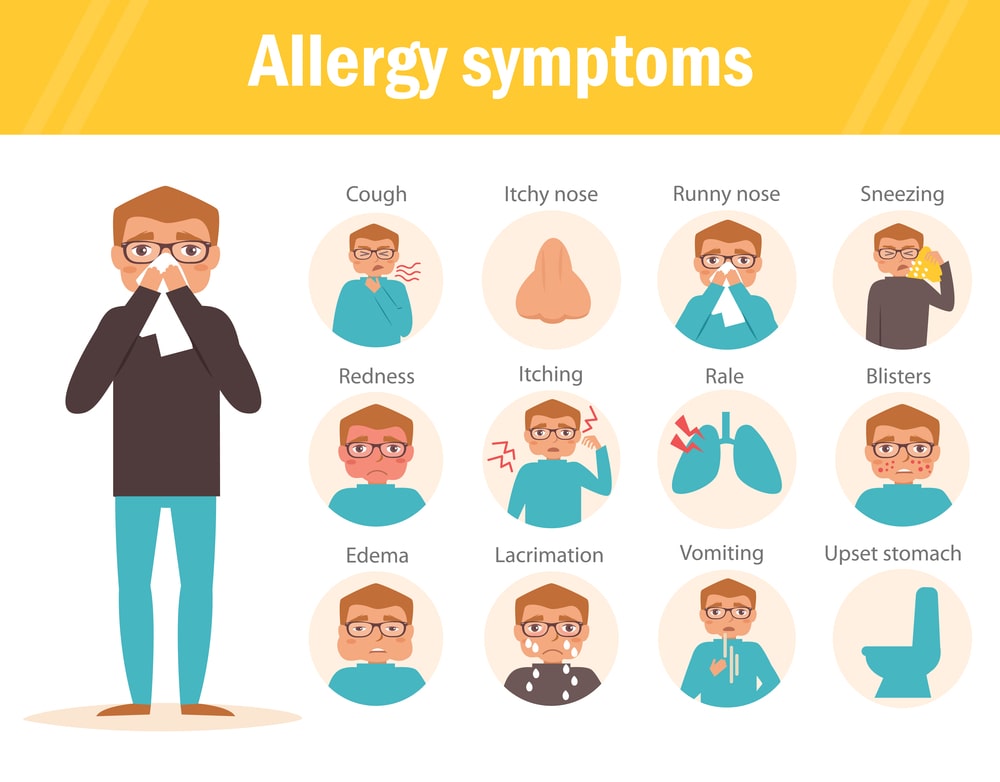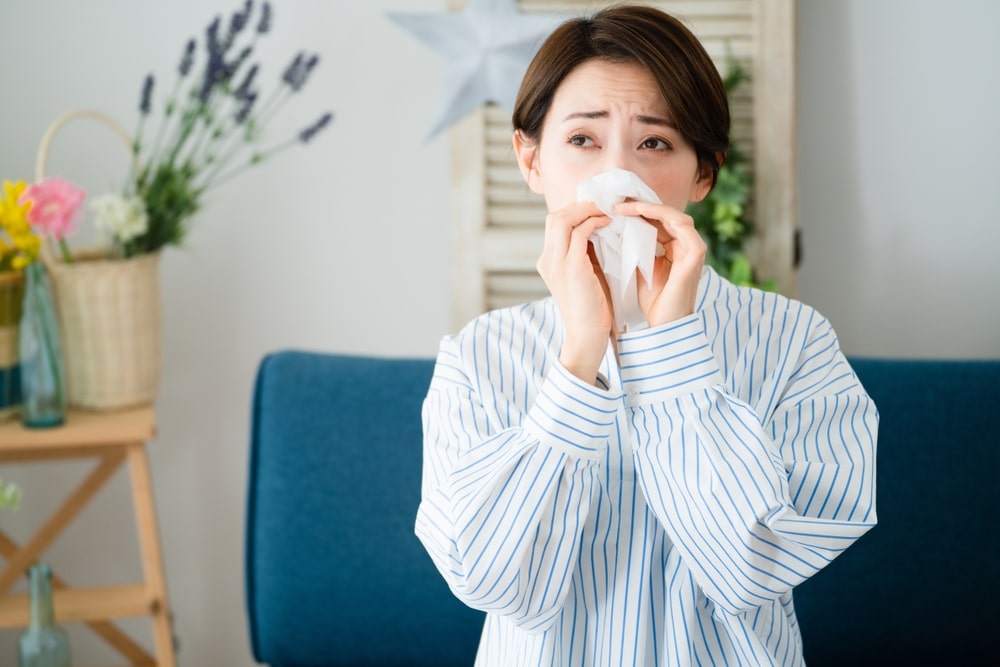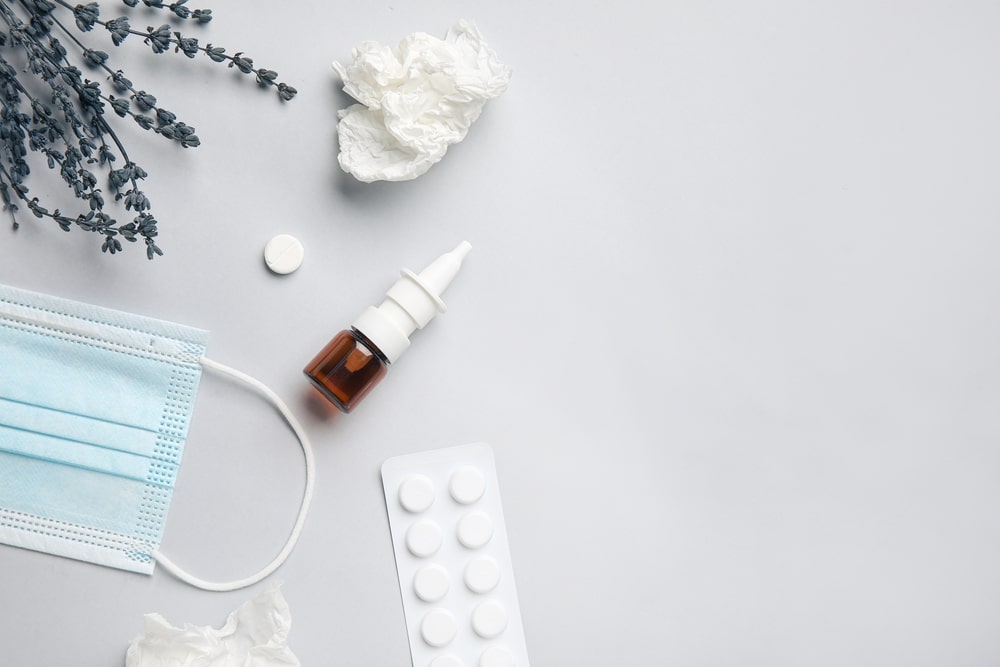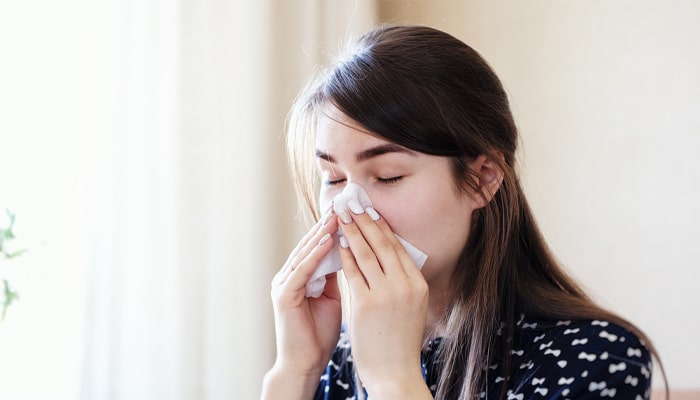Everything You Should Know About Seasonal Allergies
Seasonal Allergies, also known as “Hay Fever” or “Seasonal Allergic Rhinitis“, occur when a person’s immune system overreacts to external allergies like pollen. It occurs seasonally or year-round. The most common culprits of these allergies are pollen from grasses, weeds, and trees. They release tiny pollen particles into the air to fertilize other plants.
Seasonal allergies are very common with more than 10 million cases in India. Allergic rhinitis affects 10% – 30% population of the world. Some researchers believe that nasal allergies in the United States 30% of adults affect around 50 million people and 40% of children are affected by allergies.
However, the allergens differ as per the seasons. In spring, tree pollen triggers allergies whereas, in the summertime, the grass causes allergies. From late summer to the end of the fall season, ragweed causes allergies. Also, mold and dust cause allergies throughout the year.
Symptoms of Seasonal Allergies:

The most common symptoms include:
- Runny or stuffy nose.
- Watery and itchy eyes.
- Frequent sneezing.
- Congestion in your nose, ears, or chest.
- Itchy sinuses.
- Throat or ear canals.
- Postnasal drainage.
A few less common symptoms may include:
- Shortness of breath.
- Coughing
- Headache, and Wheezing.
- Asthma (people with hay fever).
Causes of Seasonal Allergies:
The exact cause of these seasonal allergies is not yet known, however, it is suspected that genetics may indirectly cause allergies. Although one does not inherit a specific allergy, he/she can tend to develop an allergy in case one of the parents has allergies. To avoid seasonal allergies, one must take certain precautions.
Hay fever occurs when a person’s immune system detects an airborne compound generally harmless as hazardous. It reacts to that compound, or allergen, by liberating chemicals such as histamines into the bloodstream. Those chemicals trigger the signs of a hypersensitive reaction.
Seasonal Allergies – Understand your options:
Seasonal allergies occur during a specific period, primarily caused by climate change. Plants that commonly cause seasonal allergies in different seasons:
- Spring: Tree pollens, specimens like oak, elm, birch, cedar, willow, poplar, horse chestnut, and alder trees.
- Summer: Grass pollens, specimens like ryegrass, Kentucky bluegrass, Timothy grass, Bermuda grass, and more.
- Fall: Weeds pollens, specimens like Ragweed, golden rod, mugwort, sagebrush, and mold.
- Winter: Mold, specimens like dust, pet dander, household mold, and dry weather.
Common triggers of Hay Fever:

These might differ from one season to another such as:
Summer:
The name hay fever comes from the hay-cutting season. This season usually occurs in the summer. However, the actual culprits of seasonal allergies that crop up in summer are grasses. And, these include timothy grass, ryegrass, and various weeds. As per the Asthma and Allergy Foundation of America, the most common triggers for the incidence of hay fever are grasses.
Spring:
Trees account for the maximum number of seasonal allergies that occur during spring. Birch is the most common offender present in northern latitudes. And, a lot of individuals experiencing hay fever respond to its pollen. Other allergenic trees involve willow, cedar, poplar, alder, and horse chestnut.
Fall:
The ragweed season is referred to as the autumn season. Another name for ragweed is Ambrosia, and it involves above 40 species globally. Many of them are cultivated in the temperate areas of North and South America. Ragweed is an invasive plant that is challenging to control. Its pollen is a very common allergen, and signs of its hypersensitivity might turn severe. A few other plants whose pollen drop in the fall can be plantains, nettles, mugworts, fat hens, and sorrels.
Winter:
By the time winter arrives, most external allergens lie inactive. Hence, a cold climate provides relief to a lot of individuals experiencing hay fever. However, it also implies that more people are spending time sitting inside. If a person is inclined to seasonal allergies, he or she might also respond to internal allergens. These may include cockroaches, mold, dust mites, or pet dander.
Tips for eliminating these allergens from homes:
Below are some tips for clearing the homes of these common allergens:
- Dispose of carpets and stuffed furniture.
- Wash the bedding in very hot water one time every 7 days.
- Take away the stuffed toys from the kid’s bedrooms.
- Use a dehumidifier to reduce excess moisture.
- Fix water leakages and clear out water damage that might aid pests or mold in growing.
- Cover the pillows and bedding using allergen-proof covers.
- Clean moldy surfaces or any other places where mold can grow. These may include refrigerators, humidifiers, air conditioners, and swamp coolers.
Diagnosing Seasonal Allergies:
Hay fever is generally simpler to identify as compared to other allergies. If a person experiences hypersensitive signs that only crop up during certain times of the year, it might indicate that he or she has seasonal allergic rhinitis.
The concerned healthcare provider might also check the throat, ears, and nose to make a clear diagnosis. Allergy testing generally is not essential. The treatment for seasonal allergies would likely be similar, regardless of the type of allergen a person reacts to.
Preventing Seasonal Allergies:
Some ways to prevent seasonal allergies:
- It is advisable to use an air conditioner instead of ceiling fans during summer to cool your home.
- Make sure the AC has a HEPA filter.
- Avoid going out when the pollen count is high.
- One must check the local weather network and should remain indoors in case the pollen count is high.
- When the hay fever is active, keep your windows shut.
- Avoid outdoor activities and wear a dust mask whenever you have to go out.
- Take a shower and change clothes after coming home.
- Make sure that your pets are also clean as their fur can contain dander and outdoor allergens.
- It is vital to stay away from cigarette smoking as it can aggravate the symptoms.
Treating Seasonal Allergies:

The best medication for seasonal allergies like hay fever or rhinitis is avoidance of allergens that activate the related signs. Moreover, medications are available to treat the signs of hay fever. A few individuals might also go for alternative treatments.
Avoidance:
People must exercise steps to prevent seasonal allergens. For example, making use of an air conditioner using a HEPA filter. It cools houses in summertime, instead of ceiling fans. It is always better to check the local climate for pollen predictions.
Also, make sure to stay inside when pollen counts are high. When the seasonal allergies are active:
- Do not move outside.
- Keep the windows shut.
- Wear a dust mask while outside, particularly on breezy days.
Also, it is vital to avoid cigarette smoke, which might exacerbate the signs of hay fever.
Medication:
You can also take the help of Allergy medications (Like Clarinex, Benadryl, Allegra, Flonase, Singulair, Zyrtec, etc.) that are anti-histamines. You can take combination drugs consisting of Phenylephrine, Acetaminophen, and Diphenhydramine. Also, there are some prescription drugs including the steroid nasal sprays.
Corticosteroid Nasal Sprays:
These drugs help to improve nasal signs. Examples are budesonide, fluticasone propionate, and triamcinolone. Discuss with a doctor concerning the chronic use of such corticosteroid nasal sprays.
Cromolyn Sodium Nasal Spray:
This nasal spray helps relieve the allergy signs. It works by inhibiting the release of immune system substances that trigger these signs. The nasal spray works best if people start the treatment before getting exposed to allergens. It’s well-thought-out as a very safe treatment. It generally requires to be used 4 to 6 times daily.
Oral Decongestants:
Oral Decongestants including pseudoephedrine help offer brief relief from nasal stuffiness. A few allergy drugs combine a decongestant with an antihistamine. Examples are loratadine-pseudoephedrine, cetirizine-pseudoephedrine, fexofenadine-pseudoephedrine. Discussion with a doctor regarding whether the utility of a decongestant is safe for treating allergy signs is very important.
All these medicines slow down the action and production of the naturally released histamines in your body. It is advisable to take these medicines before the allergy season starts, as it helps in better preventing the occurrence of the allergy.
In severe cases, the doctor may suggest allergy shots, which are a type of immunotherapy that helps to desensitize the immune system to allergens. However, some allergy medicines may cause side effects such as dizziness, confusion, and drowsiness.
In serious cases, healthcare providers might suggest allergy shots. They’re a form of immunotherapy that might aid in desensitizing a person’s immune system to allergens. Gradually, these injections or allergy shots decrease the reaction of the immune system which results in signs. For a few other allergies, treatment might be administered as tablets kept under the tongue.
Alternative Treatments:
Research studies are being performed on alternative treatments for seasonal allergies. Few individuals believe the following alternative treatments might offer relief:
- Spirulina, blue-green algae
- Quercetin, a type of flavonoid that offers color to the fruits and veggies
- Lactobacillus acidophilus, the “friendly” bacteria present in yogurt
- Vitamin C contains powerful antihistamine properties
The signs of seasonal allergies might be uncomfortable. When a person identifies that he or she has seasonal allergies, it is a must to visit a doctor. Healthcare providers may aid in diagnosing the cause of these signs and recommend a treatment plan.
They would likely reassure a person to adopt steps to prevent these allergy triggers. Also, they might suggest some OTC or prescription drugs. It is prudent to seek help from your doctor as soon as you experience the symptoms of seasonal allergies.

